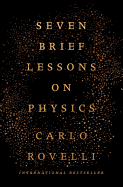
In this succinct essay collection, theoretical physicist Carlo Rovelli expertly describes seven of the most intriguing theories in physics that have been presented in the 20th century. Beginning with Einstein's general theory of relativity, Rovelli analyzes a complex idea and breaks it down into simple images and descriptions that a broad audience can understand. Einstein took Newton's idea of the gravitational field being diffused through space one step further, and realized that "space is no longer something distinct from matter--it is one of the 'material' components of the world. An entity that undulates, flexes, curves, twists.... Planets circle around the sun, and things fall because space curves." From this point, Rovelli jumps into quantum theory, then moves to the macrocosm of the universe and the microcosm of elementary particles (electrons, quarks, photons and gluons), before delving into "Planck stars" and loop quantum gravity theory--a concept that he has helped create, in which the grains of space are looped or linked together, giving space a texture, "like the rings of a finely woven immense chain mail."
He also explores the concept of time and demonstrates how black holes are "hot" spots in dark matter, giving off heat like a wood stove, a theory successfully demonstrated by physicist Stephen Hawking. Rovelli's enthusiasm for his subject is evident throughout, and his conversational tone brings an often dry subject to vibrant life. For those curious about the natural world and who wonder what actually exists outside Earth's atmosphere, Rovelli's explanations will intrigue and delight. --Lee E. Cart, freelance writer and book reviewer

